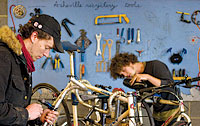Sitting cross-legged on a grimy concrete floor, Luap Devlin-Garnatt tinkers with the bicycle wheel in his lap. His small workspace is part of a former glass factory in one of the seedier sections of Asheville’s River District, sandwiched between the railroad and the French Broad. Surrounding Devlin-Garnatt are bins overflowing with reflectors, derailleurs, saddles and pedals; a kaleidoscope of colorful forks; piles of chain-rings; dozens of rims suspended from the rafters; and bicycles nearly everywhere you look: hanging, stacked and set in work stands.

The bikes include a dated Western Flyer three-speed with one wheel, the frame of a Trek 820 mountain bike, and a vintage black touring cycle with fenders arching over its front and rear tires.
Devlin-Garnatt, a 13-year-old with long blond hair, is lacing new spokes onto his wheel—just one of a few skills he’s honed at the Asheville ReCyclery, a community bike-maintenance shop. The volunteer-run nonprofit is one of many similar shops across the country, from Oakland to Albany. Together, they’re transforming castoff bikes into respectable road machines. One of the better-known such operations, Bikes Not Bombs in Jamaica Plain, Mass., rehabilitates worn-out bikes in an effort to promote world peace and social justice. The ReCyclery’s scope is less global, but its vision is arguably just as noble: to get more people pedaling.
Joseph Crawley operates the ReCyclery. When the dot-com boom crashed in 2001, Crawley, a tech professional, decided to skip out of California and return to his former home state of North Carolina. Crawley was joined on the trip by his brother and a friend, and being in no rush to get back, the trio decided to undertake its exodus by bicycle.
The brother bailed midjourney, but Crawley and Mike Adams continued east on two wheels, and along the way they hatched a plan to open a community bike shop. Not your average bike shop, mind you—the kind with rows of glitzy new rides and that rubbery, new-bike smell. Instead, what they envisioned was a place more like an architectural salvage company, with an inventory that would rely on donations, leftovers and discarded parts. Rather than charging exorbitant prices for outmoded doorknobs, their salvage operation would enable impecunious cyclists to repair, assemble and buy a bike.
Gathering every frame, freewheel and crank set they could find, they operated for a time out of a shed in Woodfin. Six years and several spaces later—including the second floor of the nearby Phil Mechanic Studios—the Asheville ReCyclery just celebrated its first anniversary in its current incarnation near the Craven Street Bridge.
At first glance, this cluttered depository seems like a bicycle graveyard, but behind its grubby appearance and stockpile of parts lies a sensible organization. It’s like the cabinet beneath your kitchen sink—the maze of plumbing in the dim, constricted space takes some scrutiny to grasp, but eventually the tangle unravels and the system’s practicality becomes obvious.
“By far it’s the best space we’ve had,” says the soft-spoken Crawley. The ReCyclery, he explains, has recently seen an increase in the number of users, which he believes is partly attributable to higher gas prices and the current shop’s more accessible, ground-level space.
On a Thursday afternoon, the ReCyclery has a characteristic flavor. All four work stands are in use as three volunteers deliver advice, over the blare of a boom box, to patrons like Chris Bowers, a filmmaker who’s in for the first time working on a bike given to him by a friend.
Also in the shop is house painter Gabrielle Macrae, who’s changing the stem on a sleek silver road bike she acquired from the shop. A bike is Macrae’s primary mode of transportation in Asheville, and this summer, she plans to tour Europe on two wheels.
Still, in a world that favors internal-combustion engines for transportation, repairing old bikes might seem an old-fashioned skill, much like canning tomatoes. So why would anyone want to come here?
“We have a different customer base,” says Crawley. “If you go to a retail bike shop, it’s like going to a car lot. For a lot of people, the cost of a new bike is a deterrent—our goal is to make bike transportation more accessible and cheaper for the community.”
A donation will net you an old frame or parts, the use of the shop’s tools and an earful of good advice. Although the shop does sell reconditioned bikes (like the $35 beach cruiser up front) and an assortment of new parts such as tires, its primary focus isn’t retail. The Petroleum Age may not be dead yet, but these idealistic bike-keepers are part of a grass-roots revolution promoting this low-cost, renewable form of transportation—one spoke at a time.
“It’s like a lot of things these days,” says Crawley. “People don’t have time to learn. But bike repair is so much easier than fixing your car. Anyone can do it.”
[Jack Igelman lives in Asheville.]
Asheville’s ReCyclery is at 173 W. Haywood St. and Riverside Drive, slightly north of Clingman Avenue and the Phil Mechanic Studios. Hours are Tuesday and Thursday from 4 to 8 p.m. and Saturday from 1 to 5 p.m. Call the shop at 255-7916, or e-mail arecyclery@yahoo.com . For more information about cycling’s global resurgence, visit the International Bicycle Fund’s Web site at ibike.org .



Before you comment
The comments section is here to provide a platform for civil dialogue on the issues we face together as a local community. Xpress is committed to offering this platform for all voices, but when the tone of the discussion gets nasty or strays off topic, we believe many people choose not to participate. Xpress editors are determined to moderate comments to ensure a constructive interchange is maintained. All comments judged not to be in keeping with the spirit of civil discourse will be removed and repeat violators will be banned. See here for our terms of service. Thank you for being part of this effort to promote respectful discussion.